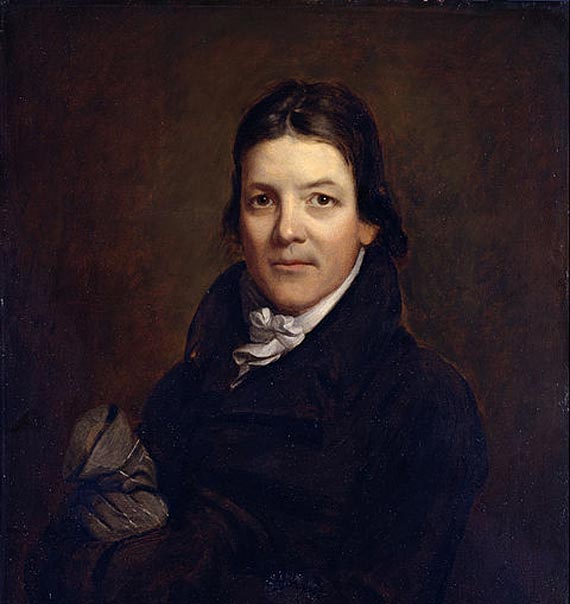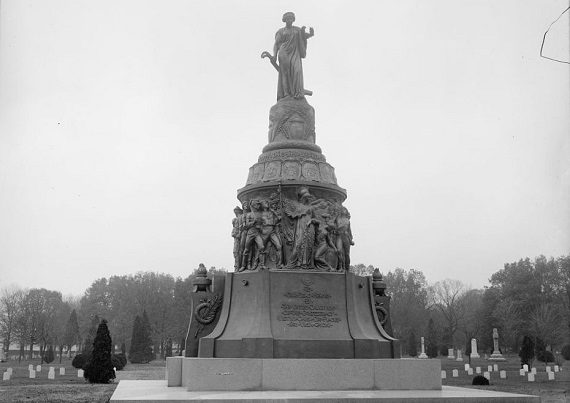A review of John Randolph of Roanoke (Louisiana State University Press, 2012) by David Johnson
One might assume that John Randolph of Roanoke, who may be the most singular individual in American political history, would be the subject of numerous biographies. The earliest attempt to capture something of the man was Powhatan Bouldin’s Home Reminiscences, written in 1878, a book of sketches and episodes. Philip Bruce and William Cabell Bruce wrote more exhaustive treatments of Randoph, especially the latter, but these focused primarily upon Randolph’s political career. Herny Adams’s treatment of Randolph was a species of revenge against the ancient enemy of his family; one finds echoes of Adams in Irving Brant’s biography of James Madison and Robert Remini’s work on Andrew Jackson. More conceptual accounts such as, Russell Kirk’s, John Randolph of Roanoke: A Study in American Politics and Robert Dawidoff’s, The Education of John Randolph were in depth examinations Randolph’s political career and principles, and in Dawidoff’s case, an analysis of the influence Randolph’s formal and informal education had upon his worldview. What has been missing is a one volume treatment of the whole man, in all his complexities, brilliance, and pathos. David Johnson has admirably filled this gap with a sympathetic, yet critical biography of a Southerner whose significance is still very much with us.
For Johnson, two crucial questions are raised by the life and career of Randolph. First, how can Randolph inspire “such enduring appeal” when his life and career were married to “such erratic contemporary relevance”? Closely related to this is the second question, what drove Randolph into opposing the administration of Thomas Jefferson, and every subsequent administration, at the cost of influence, friendships, and “contemporary relevance”? As Johnson rightly points out, many of Randolph’s closest associates, Nathaniel Macon, Dr. Joseph Nicholson, and others, never embarked on the same course even as they embraced the principles Randolph also held dear. The question takes on an even more complex tone when one considers Henry Adams’s (Randolph’s most vicious critic) assessment of Randolph, who, with John C. Calhoun, Adams designated the “sable genius of the South.” Adams viewed Randolph as, “the truest, ablest Republican in Republican in the Congress . . ..” Johnson’s answer is that Randolph’s unflinching commitment to civic virtue and liberty, coupled with his opposition to the sterile uniformity born of devotion to abstract notions of equality, which is the sire of tyranny in Randolph’s view, is “the key . . . to the life, career, and enduring significance of John Randolph of Roanoke.”
Though an admirer of Randolph, Johnson is not uncritical of the man. Randolph’s quick temper, his biting sarcasm, his feuds with colleagues obscure and prominent are all laid bare. Too often, he would go too far in an insult on the floor of the House and the Senate, making enemies, causing consternation among his friends, and of course leading to the famous duel with then Secretary of State Henry Clay. Randolph’s long-standing feud with his sister-in-law Nancy Morrison is recounted in detail, as are the deep tragedies of Randolph’s personal and family life. In many of these trying circumstances, Randolph does not acquit himself well and is all too human in his willingness to believe the stories of those who confirm his biases. His estrangement from his stepfather Henry St. George Tucker is another of these sad affairs. Good historian as he is, Johnson found no grounds for Randolph’s accusations of financial malfeasance and incompetence on the part of Tucker in the handling of Randolph’s father’s estate. Nor does Johnson flinch from examining Randolph’s peculiar physical ailment that seemed to leave him frozen in early puberty—Johnson believes Klinefelter’s disease as the probable culprit. Meanwhile, Randolph’s well documented abuse of alcohol and opium are to Johnson an attempt on Randolph’s part at self-medicating bi-polar illness. Johnson is also deft in his criticism of Randolph as a slaveholder. While recognizing that the sources of the day portray Randolph as coming closer to the idea of the benign paternal master than any of his contemporaries, Randolph was capable of a kind of unfeeling cruelty such as when he refused to sell the wife of a slave from a neighboring plantation to her husband’s master. For the enemies of Randolph, both past and present, his maladies, failures, periods of stark isolation are symptomatic of his depravity.
Yet, what Randolph’s enemies ignore, and Johnson to his great credit does not, is Randolph’s generous spirit. Randolph took great pains to provide for his slaves and granted them their freedom in his will along with provisions and funds to resettle in Ohio. He took care of his deceased brother’s wife and deaf-mute child. He proved a generous and kind uncle to his nieces and nephews; his paternal concern for their education and moral development is striking. Randolph counted friends on both sides of the political aisle. Josiah Quincy and Francis Scott Key, both of whom were Federalists, were especially close, as was the chief Justice John Marshall. Men who he antagonized found much to admire in Randolph. John C. Calhoun and Henry Clay being the foremost examples, though this also speaks to the personal magnanimity of both men. There is no doubt that Randolph was deeply committed in his hate, but also in his love.
In assessing Randolph’s greatness, Johnson hits the mark. More can be said. Johnson’s excellent scholarship points to an important feature of Randolph too often overlooked nor explicitly stated by Johnson. In an age when people suffered great tragedies as a regular course of life: the untimely loss of family, fire and flood, illness, Randolph suffered more than his fair share of these. Moreover, his commitment to principles in politics meant that for long stretches of time he was isolated and alone. Yet, given all the maladies under which he labored, the challenges of his temperament, the personal losses, he achieved a level of greatness and significance few members of Congress would dare hope for. Randolph made Henry Clay vacate the chair, retreat to the lobby pacing and taking snuff, while he eviscerated the Speaker’s pet bill for internal improvements. He influenced John C. Calhoun’s political course; he thwarted Daniel Webster’s desire to intervene in the Greek rebellion against the Turks. All this while being a successful planter, breeder of thoroughbred racehorses, and prolific correspondent with nearly everyone who mattered in the early years of the republic.
As Johnson points out, Randolph’s singular commitment to liberty and the American Revolution is key to understanding the man and his legacy. I would add that Randolph’s understanding of the War for Independence was that of the antifederalists and not that of Alexander Hamilton or Fisher Ames. In a letter to Josiah Quincy, Randolph wrote, “I was an anti-Federalist when hardly breeched.” This is crucial. Randolph kept alive and viable the anti-Federalist critique of central authority and warned at every turn of the dangers of political consolidation. In our day, as the political vultures and lobbyists hover over a decaying imperial regime, Randolph remains an important reminder of what has been lost and sacrificed on the altars of democracy, modernity, and ill-advised foreign interventions.
Johnson’s biography is an outstanding and necessary addition to the large body of work already done on Randolph. He has integrated the complexities of Randolph’s condition, principles, and actions into a fascinating and sympathetic portrait of one of the South’s and America’s great statesmen. It will remain the standard biography for a long time.







“In our day, as the political vultures and lobbyists hover over a decaying imperial regime, Randolph remains an important reminder of what has been lost and sacrificed on the altars of democracy, modernity, and ill-advised foreign interventions.” What a brilliantly written line! Great artcle